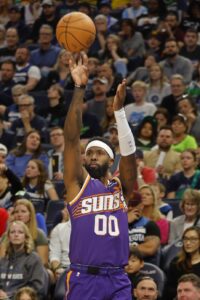Hoops Rumors is checking in on the 2024 offseason for all 30 NBA teams, recapping the summer’s free agent signings, trades, draft picks, departures, and more. We’ll take a look at each team’s offseason moves and consider what might still be coming before the regular season begins. Today, we’re focusing on the Phoenix Suns.
Free agent signings
 Royce O’Neale: Four years, $42,000,000. Includes an additional $2MM in unlikely incentives. Re-signed using Bird rights.
Royce O’Neale: Four years, $42,000,000. Includes an additional $2MM in unlikely incentives. Re-signed using Bird rights.- Josh Okogie: Two years, $16,000,000. Second year non-guaranteed. Re-signed using Bird rights.
- Bol Bol: One year, minimum salary. Re-signed using minimum salary exception.
- Tyus Jones: One year, minimum salary. Signed using minimum salary exception.
- Damion Lee: One year, minimum salary. Signed using minimum salary exception.
- Monte Morris: One year, minimum salary. Signed using minimum salary exception.
- Mason Plumlee: One year, minimum salary. Signed using minimum salary exception.
Trades
- Acquired the draft rights to Ryan Dunn (No. 28 pick), the No. 56 pick in the 2024 draft, the Nuggets’ 2026 second-round pick, and the Nuggets’ 2031 second-round pick from the Nuggets in exchange for the draft rights to DaRon Holmes (No. 22 pick).
- Acquired the draft rights to Oso Ighodaro (No. 40 pick) from the Knicks in exchange for the draft rights to Kevin McCullar (No. 56 pick) and the Celtics’ 2028 second-round pick (top-45 protected).
- Acquired E.J. Liddell from the Hawks in exchange for David Roddy.
- Note: Liddell was subsequently waived.
Draft picks
- 1-28: Ryan Dunn
- Signed to rookie scale contract (four years, $12,998,353).
- 2-40: Oso Ighodaro
- Signed to four-year, minimum salary contract ($7,895,796). First two years guaranteed. Third year partially guaranteed ($250K). Fourth-year team option.
Two-way signings
Departed/unsigned free agents
- Udoka Azubuike (Buducnost)
- Drew Eubanks (Jazz)
- Eric Gordon (Sixers)
- Saben Lee (Manisa Basket)
- Isaiah Thomas (unsigned)
- Ish Wainright (Hapoel Tel Aviv)
- Thaddeus Young (unsigned)
Other moves
- Signed Grayson Allen to a four-year, $70,000,000 veteran extension that begins in 2024/25. Includes fourth-year player option.
- Waived E.J. Liddell.
- Waived Nassir Little.
Salary cap situation
- Operating over the cap ($140.6MM), over the luxury tax line ($170.8MM), and above the second tax apron ($188.9MM).
- Carrying approximately $219.9MM in salary.
- No hard cap.
- No form of mid-level or bi-annual exception available.
- One traded player exception available (worth $726,547).
- One traded player exception frozen/unavailable (worth $1,119,563).
The offseason so far
The Suns’ first season with their “big three” of Devin Booker, Kevin Durant, and Bradley Beal was a disappointing one. Although Phoenix compiled 49 wins, injuries limited the time the three stars spent on the court together – the full trio appeared in just 41 of 82 regular season contests – and the team didn’t win a single playoff game, having been swept out of the first round by Minnesota.
Despite questions about their fit together and their respective injury histories, the Suns weren’t about to give up on their big three so soon. General manager James Jones and team owner Mat Ishbia shot down trade rumors involving Durant, Booker, and Beal this offseason as the front office focused on making changes around those stars, rather than breaking them up.
 Those changes began on the sidelines, where Phoenix opted to move on from head coach Frank Vogel less than one year after signing him to a five-year contract worth a reported $31MM. No team embarking on a coaching search this spring moved faster than the Suns, who zeroed in on Mike Budenholzer and announced his hiring less than 48 hours after confirming Vogel’s dismissal.
Those changes began on the sidelines, where Phoenix opted to move on from head coach Frank Vogel less than one year after signing him to a five-year contract worth a reported $31MM. No team embarking on a coaching search this spring moved faster than the Suns, who zeroed in on Mike Budenholzer and announced his hiring less than 48 hours after confirming Vogel’s dismissal.
The Suns have first-hand familiarity with Budenholzer’s championship pedigree, having fallen to his Bucks in the 2021 NBA Finals. They clearly believe he’s the right man to take the Suns to similar heights — after making him the sole focus of their search, they signed him to a five-year contract reportedly worth in excess of $50MM.
With Booker, Durant, Beal, and Jusuf Nurkic set to earn nearly $169MM combined in 2024/25, the Suns were always going to be operating over the second tax apron ($188.9MM), which meant they’d have limited resources to upgrade their roster via free agency or trade. As a result, their goals in addressing the roster were threefold:
- Re-sign key role players Grayson Allen and Royce O’Neale, since they’d have no means to replace them if they departed as free agents.
- Add inexpensive young talent in the draft.
- Make savvy minimum-salary veteran signings.
The offseason was a success on all three fronts.
While you can quibble with the money or the term the Suns committed to Allen (four years, $70MM) or O’Neale (four years, $42MM), losing either player wasn’t a viable option. The team badly needs Allen’s shooting and O’Neale’s defense to complement its stars. Given its lack of leverage in those negotiations, Phoenix is fortunate the final numbers on the contracts don’t look worse.
The Suns were active on draft night, moving six spots down in the first round and 16 spots up in the second. The team ended up coming away with two players it was reportedly high on – forwards Ryan Dunn and Oso Ighodaro – while adding to its depleted stash of future draft picks in the process.
In free agency, the Suns brought back a couple of their own free agents (Bol Bol and Damion Lee) on minimum-salary contracts but did their best work with outside targets, landing center Mason Plumlee and point guards Tyus Jones and Monte Morris. I expected all three players, particularly Jones, to sign for more than the veteran’s minimum, so they look like bargains to me. And Jones and Morris are exactly the type of players Phoenix needed — ball-handling guards who take extremely good care of the ball.
The one signing that looks questionable from a value perspective is Josh Okogie, who received a two-year, $16MM contract that is fully guaranteed for the first year. Giving Okogie an $8.25MM salary for 2024/25 allows the Suns to treat him as a walking trade exception, but without the ability to aggregate his salary with another player’s or take back more than $8.25MM in a trade involving him, it remains to be seen how useful that will be.
Okogie probably doesn’t contribute enough on offense to warrant that $8MM+ salary based solely on his play on the court. Of course, as long as Ishbia is willing to pay the substantial excess tax penalties that come with giving Okogie that $8.25MM salary instead of a minimum contract, there’s no real downside for the Suns, since the deal doesn’t hamstring them in any other ways.
But as Phoenix showed when it waived and stretched Nassir Little‘s and E.J. Liddell‘s remaining salary ahead of the August 31 stretch provision deadline, Ishbia’s pockets aren’t bottomless. The Little move, in particular, will have a long-term impact — he’ll count against the books for $3.1MM through the 2030/31 season.
Up next
After waiving Little and Liddell, the Suns have 14 players on guaranteed contracts and three players on two-way deals. While two-way changes are always possible leading up to opening night, I’m skeptical Phoenix will be eager to add a 15th man to the standard roster. Keeping that spot open to start the season would allow the team to assess its options, save some money, and move quickly in the event that a specific position is hit hard by injuries during the season.
Durant and Nurkic are the two players on the roster eligible for extensions up until October 21, but I wouldn’t expect extending Nurkic – who has two years and $37.5MM left on his existing contract – to be a top preseason priority for the Suns. While Nurkic is Phoenix’s starting center for now, he’s not a lock to still be on the roster beyond his current deal, or even until the end of it.
Durant is a more likely extension candidate. Based on his contract situation (two years left) and the Over-38 rule that prevents him from tacking on two new years, he’s essentially eligible for a slightly less lucrative version of the Stephen Curry deal. A one-year extension for Durant would be worth a projected $59.5MM.
The Suns and Durant don’t have the long history of success together that the Warriors and Curry have, so it remains to be seen whether they’ll be as eager to add another year to their agreement. If it doesn’t get done before opening night, the two sides would have another chance to negotiate an extension next offseason. However, putting off those talks could leave the door open for those trade rumors that popped up earlier this offseason to resurface by February’s deadline — especially if the Suns struggle in the first half.
Unless the coaching staff has the guts to pull the trigger on Beal leading the second team, and pressuring him to step up defensively, it’ll be another disappointing season in Phoenix.
Two things the Suns are virtually guaranteed to lead the NBA in —
payroll and luxury tax.
And next season the tax will skyrocket to a new level because of repeater penalties.
Will $400M buy a playoff victory this year?
Sillivan # 2?
Bradley Beal is a top notch scorer but he doesn’t fill in any of the criteria of the Suns’ weaknesses on the court. He fills the same role KD & Booker do.
Trade, Trade, Trade
Can’t, can’t, can’t.
No one is trading for Beal and the 3/160 remaining on his contract.
As Cam above suggests, they should use him like CJ McCollum in New orleans. Skilled ball handler and scorer off the bench leading the 2nd unit.
You have to start Grayson Allen’s shooting and defense on this team. Absolute must.
You know who sucks !!!!! GM(KD)
Can Beal play 60 games this year? Jones at pg is a relief but can Book be the actual leader of this team? Surely he learned something while playing with CP3.
Yes great questions. I’m not sure if Booker is a leader. He’ll do what it takes whatever that is and he’ll listen to what he’s told, but leading and being vocal and suggesting? I’m not sure that’s him. Probably not KD either lol.
They’re just a bunch of talented guys with no leadership. Phoenix was pretty good five or so years ago then Chris Paul came aboard and they became great. I don’t know if they have a Chris Paul now maybe tyus Jones can play that role?
Not sure a part time starter to this point making a minimum salary can be a leader here? Hopefully he breaks the mold and makes it happen out of necessity.